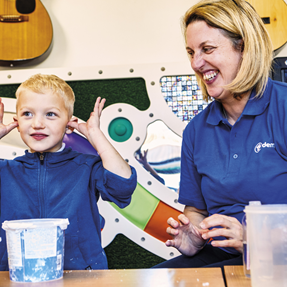Jenna has been a nurse with Demelza for 17 years – hear from her as she talks about the essential clinical care and support she has provided families in East Sussex over the years.
My sister has cerebral palsy and when she was 15 years old we were told her condition was life-limiting; she wasn’t supposed to live to see her twentieth birthday. She was referred to James House for support at that point – James House would later become Demelza’s East Sussex community team.
We went to a few social events and met with lots of the team, and they were so supportive and friendly that it sowed the seeds in my head that I might one day become part of the Demelza team. Fast-forward to the present day and my sister is still living a happy life in her thirties, while I’ve been a nurse for Demelza for 17 years! I just love it here. The work is so varied and it’s really hard to nail down what an average day looks like.

To take today as an example, I’ve been doing some training with one of our healthcare assistants this morning to ensure their competencies are up to date; then I went to meet a parent whose child had been having a tough summer with lots of health complications, to discuss what kind of additional support I can offer; then we had a planned after-school respite session at a family’s home which required a nurse due to more complex health needs. You plan your day around the families and what they need – whatever it is you can do to make the biggest difference to them.
Even the respite visits look different for each family. There’s one child I visit who often has a soak in the hot tub while I’m there, so I’ll get in with them and do some light physiotherapy in the warm water – that’s always a hard visit! For other families, a respite visit will mean we take their child out to the park so their parents can have a bit of a break from their care.
We might change a nasogastric tube or a gastrostomy if that’s due to be done, which can save the parents or community nurses a job. We also have access to equipment families might not have, like portable hoist scales, which we can bring out to their home so they don’t have to go through the complicated process of taking their child to the hospital just to have them weighed. It’s about that blend of clinical care and fun that Demelza nurses can bring because we have the time to do it.
We do manage end of life cases in the community as well, and we prioritise those above anything else; we provide a 24-hour on call service, so it’s about managing workload with other nurses and making sure shifts are covered so you can be there for that family.
That support can be simple, like dropping something off that the family needs but can’t get themselves, or it might be that the child has really deteriorated and needs further care. This can look like setting up syringe drivers to make the child more comfortable, communicating with tertiary palliative care teams and the wider multi-disciplinary team, getting drug charts signed, and anything else that means they’re getting the clinical care, as well as the practical support, that they need at that moment.
Demelza is just a different place to work. There are children and young people who I’ve known since they were just babies, who are now coming up on their 18th birthdays; to have had the time and the space to get to know them, and to be able to support them as they move on to the next stage of their lives, is a real privilege.